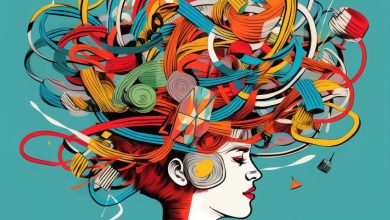Exploring the Connection Between INFJ and ADHD

🎧 Listen to this Article 🎧
INFJ, a personality type known for its unique blend of characteristics.
INFJs are often called the “Advocates” or “Counselors.” They’re deep thinkers, highly empathetic, and driven by their values.
Okay, now let’s switch gears to ADHD…
Attention Deficit Hyperactivity Disorder, a neurodevelopmental condition with traits like inattention, impulsivity, and hyperactivity.
In this article, we’re going to explore possible answers to an interesting question:
Is there a connection between the distinctive INFJ and ADHD?
We’ll dive into this potential link, supported by scientific evidence and expert insights, to shed light on this intriguing topic.
What is INFJ Personality?
INFJ personalities are a fascinating group with distinct traits, strengths, and weaknesses. To comprehend their uniqueness, let’s dive deeper into their world.
Traits
INFJs are marked by their:
- Introverted Intuition (Ni): This cognitive function allows INFJs to see hidden connections, envision future possibilities, and grasp complex ideas effortlessly. It’s like having an internal crystal ball guiding their insights.
- Extraverted Feeling (Fe): Empathy is the hallmark of INFJs. They excel at understanding others’ emotions and are driven by a deep desire to help, making them natural counselors and advisors.
- Introverted Sensing (Si): This function helps them draw on past experiences for guidance and stability.
- Extraverted Sensing (Se): Though less prominent, Se can emerge in INFJs, making them open to new sensory experiences.
Strengths
- Compassion: INFJs are renowned for their empathy and compassion, making them excellent listeners and supporters.
- Creativity: Ni, their dominant function, fuels their creativity and innovation.
- Insightfulness: Their ability to read between the lines and grasp underlying meanings gives them a unique perspective.
Weaknesses
- Perfectionism: INFJs’ high standards for themselves and others can lead to stress and burnout.
- Overthinking: Ni’s constant analysis can sometimes lead to overthinking and indecision.
Understanding these facets of the INFJ personality lays the groundwork for exploring any potential connection with ADHD. Now, let’s journey deeper into ADHD’s realm and its defining features.
Suggestion for INFJs:
INFJ Mental Illness | What Mental Illness Do INFJs Have?
Understanding ADHD

Now that we’ve explored the INFJ personality type, it’s time to delve into the world of ADHD (Attention Deficit Hyperactivity Disorder). Let’s break it down.
ADHD is a neurodevelopmental disorder that affects people of all ages. It’s typically categorized into three subtypes:
- Inattentive Type: Individuals with this subtype struggle with sustained attention, organization, and following through on tasks. They often make careless mistakes and are forgetful in daily activities.
- Hyperactive-Impulsive Type: This subtype is characterized by restlessness and impulsivity. People with this type often interrupt others, can’t sit still, and act before thinking.
- Combined Type: As the name suggests, this type includes symptoms of both inattentiveness and hyperactivity-impulsivity.
Common Symptoms and Challenges
ADHD presents a range of challenges, including:
- Inattention: Difficulty focusing on tasks, following instructions, and completing assignments.
- Hyperactivity: Restlessness, fidgeting, and difficulty remaining seated in situations where it’s expected.
- Impulsivity: Acting without thinking, blurting out answers, and interrupting others.
- Emotional Dysregulation: Difficulty managing emotions, leading to mood swings and frustration.
Neurobiological Basis
ADHD’s roots lie in the brain’s structure and function. Neuroimaging studies have shown differences in brain size and activity patterns in individuals with ADHD. The prefrontal cortex, responsible for executive functions like decision-making and impulse control, often shows variations in those with ADHD.
Understanding the subtypes, symptoms, and neurobiology of ADHD sets the stage for our exploration of any potential links between INFJ personalities and ADHD-like traits. Let’s continue our journey.
| Read more: ADHD in Adults: Symptoms and Effective Managing Strategies
Potential Overlaps Between INFJ Traits and ADHD
While INFJ personality traits and ADHD symptoms may seem quite distinct, there are instances where they appear to converge.

Introverted Nature vs. Inattentiveness
INFJs are known for their introspective and introverted nature. They often prefer spending time in their inner world, contemplating ideas and insights. However, this introverted focus can sometimes resemble inattentiveness, as they may appear distant or preoccupied in social situations.
Deep Thinking and Daydreaming vs. Distractibility
INFJs are natural deep thinkers and daydreamers. Their introverted intuition (Ni) drives them to explore profound ideas and possibilities. Yet, this deep thinking can occasionally lead to distraction, as they may become absorbed in their thoughts and lose track of time or tasks.
| Also might be interesting: INFJ Personality and Eating Disorders
Empathy and Sensitivity vs. Emotional Dysregulation
Empathy and sensitivity are hallmark traits of INFJs. They possess a deep understanding of others’ emotions and are highly attuned to subtle emotional nuances. However, this heightened emotional sensitivity can sometimes lead to emotional dysregulation, where INFJs may experience intense emotional responses.
It’s important to note that while these overlaps exist, they do not equate INFJ personality traits with a diagnosis of ADHD. These are merely similarities that highlight the complexity of human behavior and psychology. In the next section, we’ll explore the potential challenges of ADHD misdiagnosis in INFJs.
Does your MBTI personality type put you at risk of ADHD?
Learn more:
ADHD and MBTI | A Comprehensive Overview
ADHD Misdiagnosis in INFJs
The overlap between INFJ personality traits and some ADHD symptoms raises an important question:
Could INFJs be at risk of being misdiagnosed with ADHD?

As we’ve seen, INFJs exhibit characteristics such as deep thinking, introverted nature, and emotional sensitivity that can mimic certain ADHD symptoms. This resemblance can potentially lead to misinterpretation.
Real-life anecdotes and case studies shed light on this issue. Some INFJs have shared their experiences of being misdiagnosed with ADHD, only to later discover that their traits were reflective of their personality rather than a neurodevelopmental disorder.
However, it’s crucial to remember that not all INFJs will experience misdiagnosis, and the diagnostic process is multifaceted. A thorough evaluation by a qualified mental health professional is essential to differentiate between personality traits and clinical conditions.
In the next section, we’ll explore strategies and coping mechanisms for INFJs who suspect they may have ADHD-like traits, providing guidance on how to navigate this complex terrain.
Navigate the Depths:
Dive into the intricate relationship between INFJ personalities, ADHD, and the shadows of
Begin this enlightening voyage of self-discovery today!
Coping Strategies for INFJ Personality with ADHD
For INFJs who suspect they may have ADHD-like symptoms or struggle with traits that resemble ADHD, there are practical coping strategies that can help them navigate daily challenges. These strategies are designed to assist with managing attention, time, and emotions.
- Mindfulness and Meditation: Practice mindfulness exercises and meditation to enhance your ability to stay present and focused. These techniques can help counteract distractibility and promote mental clarity.
- Time Management Tools: Utilize time management tools like calendars, to-do lists, and reminder apps to stay organized and on top of tasks. Breaking down larger projects into smaller, manageable steps can also ease feelings of overwhelm.
- Set Clear Priorities: Identify your most important tasks and prioritize them. INFJs often have a strong sense of values; align your activities with what truly matters to you to stay motivated and engaged.
- Create a Productive Environment: Minimize distractions in your workspace. Consider noise-cancelling headphones, organize your physical space, and limit access to social media during focused work periods.
- Emotional Regulation Techniques: Develop emotional regulation strategies, such as deep breathing exercises or journaling, to manage intense emotional responses. Recognize that your sensitivity is a strength but may require extra self-care.
- Seek Support and Accountability: Share your goals and challenges with a trusted friend or mentor who can provide encouragement and accountability. Sometimes, discussing your struggles can lead to valuable insights.
- Professional Guidance: If you continue to face difficulties, consider consulting a mental health professional who specializes in ADHD or cognitive-behavioral therapy. They can provide tailored guidance and support.

Remember that these strategies are not a substitute for professional evaluation and diagnosis. If you suspect you may have ADHD, it’s crucial to seek expert assessment to determine the most appropriate course of action.
| Suggestion: Caffeine and ADHD – Does Coffee or Caffeine Good for ADHD or Make It Worse?
Seeking Professional Help
Recognizing the potential overlap between INFJ traits and ADHD-like symptoms is just the beginning. To find clarity and effective solutions, it’s crucial to seek professional guidance.
Mental health professionals, such as psychiatrists, psychologists, or clinical social workers, have the expertise to conduct comprehensive assessments. They can differentiate between personality traits and clinical conditions like ADHD.
Accurate diagnosis is essential to determine the most appropriate interventions and support, whether it’s ADHD, a personality trait, or a coexisting condition.
Diagnostic Assessments
- Clinical evaluation: A detailed interview with a mental health professional to assess symptoms, history, and their impact on daily life.
- Standardized rating scales: These tools are used to gather information from multiple sources, such as the individual, their family, or teachers, to assess ADHD symptoms.
- Neuropsychological testing: In some cases, cognitive testing may be recommended to evaluate attention, executive functioning, and other cognitive abilities.
Treatment Options
- Medication: Stimulant and non-stimulant medications can help manage ADHD symptoms by enhancing focus, impulse control, and attention.
- Behavioral therapy: Cognitive-behavioral therapy (CBT) and other therapeutic approaches can teach coping strategies and improve executive functioning.
- Psychoeducation: Understanding ADHD and learning effective strategies for self-regulation and time management is a valuable component of treatment.
- Lifestyle modifications: Implementing healthy habits such as regular exercise, a balanced diet, and adequate sleep can complement treatment.
Also Might be Interesting…
HealWiser’s Last Piece of Advice
While coping strategies can be helpful, they should complement rather than replace professional assessment and guidance. Consulting with mental health experts is the most reliable path to accurate diagnosis and tailored support for individuals experiencing symptoms resembling ADHD.
In our exploration of the potential connection between INFJ and ADHD, we’ve uncovered intriguing overlaps in traits and symptoms. While INFJs possess unique characteristics like deep thinking, empathy, and introversion, some may exhibit ADHD-like features.
It’s crucial to emphasize that self-awareness is the first step, but professional evaluation is paramount. Accurate diagnosis and personalized treatment plans, which may include medication, therapy, or lifestyle adjustments, can make a world of difference.
Remember, understanding ourselves better and seeking expert guidance are the keys to living our best, most fulfilling lives.
Sharing your experiences can provide valuable insights and emotional support. So…
…share your story with Heal Wiser and others in the comments section below this post.





